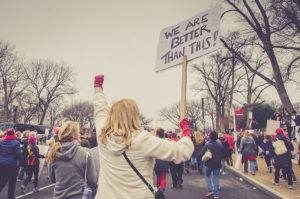Crisis vs. Opportunity: Insights from the Leadership Conference on Civil and Human Rights
 Photo by Jerry Kiesewetter on Unsplash
Photo by Jerry Kiesewetter on Unsplash ‘Tis the season for end-of-year conferences, retreats, annual meetings, and summits. And boy, am I aglow. As members of the Leadership Conference on Civil and Human Rights, the American Humanist Association was invited to their 2018 conference, aptly titled “Bend toward Justice.” I showed up ready to learn, collaborate, and take lessons back to our bright blue building near Dupont Circle in DC.
The day’s agenda was packed. Speaker after panel after breakout session after working lunch, one after another with zero breaks. The event was well crafted and everything a conference should be: invigorating, positive, and with a clear call to action.
The marquee lineup included Senators Mazie Hirono (D-HI) and Cory Booker (D-NJ); Desmond Meade, who led Florida’s successful fight to secure voting rights for the state’s 1.4 million returning citizens; Advancement Project Executive Director Judith Browne Dianis; Congresswoman Pramila Jayapal (D-WA); former Tallahassee mayor and Florida gubernatorial candidate Andrew Gillum; Rebecca Cokley, director of the Center for American Progress’s Disability Justice Initiative; Congresswoman-elect Rashida Tlaib (D-MI-13); and more.
One informal theme that resonated strongly with me (unsurprising to my coworkers in attendance) was that every single person with a microphone said the word “opportunity.” And although it started out as a blip in my notebook, the word and the way each speaker discussed opportunity filled a full page of notes. There’s a lot to take away from how we use that word.
We are in a time of political and social crisis: The number of neo-Nazi hate groups in the US increased 22 percent in 2017, a foreign nation interfered with our national elections, and our president changes policies with tweets. And although John F. Kennedy famously mistranslated the Chinese character for crisis as “danger plus opportunity,” the sentiment has stuck around. Our particular political moment is dangerous. There is no doubt that rights and liberties are being taken away from people. For example, I attended an education panel where each speaker mentioned rule changes, spearheaded by Secretary of Education Betsy DeVos, that target transgender and gender-nonconforming students, Black students, disabled students, female students, and others.
Living in a near-permanent state of crisis does terrible things to our health, our self-esteem, and our outcomes. And white supremacy capitalizes on keeping us in a state of urgency. However, the people at the Leadership Conference on Civil and Human Rights know this and are facing this current moment head on.
Senator Booker spoke about learning from his own mistakes and shortcomings—that’s an opportunity. Senator Hirono spoke about how the Kavanaugh hearings fueled the #MeToo movement—that’s an opportunity. Rebecca Cokley spoke frankly about making room for the next generation of leaders—that’s an opportunity. Desmond Meade spoke about the space we give Black people to lead, and potentially fail—that’s an opportunity. The education panel spoke about new oversight from Congress—that’s an opportunity. Congresswoman-elect Tlaib spoke about challenging polluters locally—that’s an opportunity.
When rules break down, there’s an opportunity to rebuild them correctly. When we arrive at a dangerous crossroads, there’s an opportunity to choose the better path. When we identify laws as unjust, only then do we recognize the opportunity to fix them. When people are given the space to fail, only then are there opportunities for success. This rhetoric, communicated in speakers’ powerful statements, did something to the people in the room. When we start to see crises—big and small—as opportunities, we actually change our approach to them. People are more likely to be willing to work with you to tackle a problem. This is not to say that the damage being done to people’s lives isn’t in vain. It is in vain. And children dying as they enter the US in search of safety is a tragedy, not an opportunity. But how we move forward matters.
I use the word opportunity liberally in my own work. When something doesn’t turn out the way I hoped, when I make a mistake, or when a new problem develops that I didn’t foresee, those are all opportunities to take a step back and be truly responsive. But we can’t just gloss over crises by shouting about opportunity. This positive spin only works if we also speak candidly about those shortcomings, problems, and mistakes. And that’s crucial. The community of leaders at the Bend toward Justice conference weren’t sugarcoating or redirecting. We were speaking about very real problems and working together to find very real solutions.
In the coming year the American Humanist Association will participate by sending out calls to submit public comments on rule changes, working with our partners to support necessary legislative fixes, and protesting in the streets. Social justice advocates tend to roll our eyes at how often MLK’s “bend toward justice” quote is appropriated to placate us and to slow us down, but we are taking this opportunity to take real steps and bend justice through human action.
